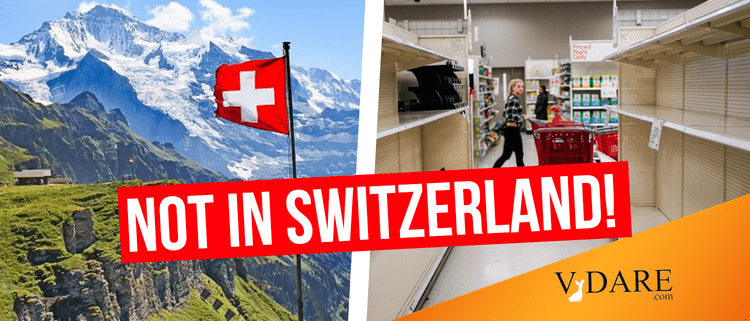
By Steve Sailer
03/27/2020
Lots of people on the left in America look to Sweden for examples of smart government policies, but almost nobody in the U.S. of any ideology looks to Switzerland for ideas, even though multilingual Switzerland would seem like a pretty successful country.
From the Financial Times:
Swiss keep calm and rest on their months of stockpiles
Switzerland has one of the largest strategic reserves of food and medicine in the worldEven in the face of a government lockdown, supply chain disruption has been at a minimum
Sam Jones in Zurich YESTERDAY
… But in the Swiss city of Zurich, the only shortages in supermarkets have been of customers.
As of Thursday evening, Switzerland had 10,714 confirmed cases of the coronavirus and 161 deaths. On a per capita basis, it is the worst-hit state in Europe, reflecting its proximity to Lombardy, northern Italy, the source of the European outbreak.
But even in the face of a Swiss government lockdown, supply chain disruption has been at a minimum.
With between three and six months’ worth of essential foodstuffs and goods kept in storage within the country’s borders, Switzerland maintains one of the largest strategic stockpiles in the world.
As of last year, Switzerland, which has a population of 8.5m, kept 63,000 tonnes of sugar, 160,000 tonnes of white flour for bread, 33,700 tonnes of cooking oil (a fifth of which is for salad dressing and mayonnaise), and just under 400,000 tonnes of specialist feed for its dairy industry in reserve. Already, Swiss authorities have dipped into some medical supplies. …
In November, a huge public outcry put a stop to plans to end the stockpiling of coffee. Government technocrats reasoned that its zero calorific value made it “unessential”. Their defeat means the Swiss currently have 15,000 tonnes of coffee beans in storage to see them through the coronavirus pandemic, if imports into the country dried up and existing commercial stocks vanished.
You can’t win a modern war without caffeine.
Adequate supply is only one half of the picture. The government has run regular public information campaigns for decades advising citizens on how to supply their households.
… The Swiss are advised to have nine litres of bottled water per person, enough food to feed someone for a week, a gas stove, candles and cash.
… Swiss lawmakers had already updated their contingency plans and stockpiling strategy in 2016, as Bern grew increasingly concerned about the fragility of modern supply chains. Officials had been alarmed by a 2015 US storm season that saw food and other goods run out quickly.
One striking feature of the Swiss system is the involvement of the private sector. …
There is no central stockpile: instead, goods are kept in reserve in the warehouses of businesses distributed across the country.
… The close integration with the private sector has huge advantages for the government. Reserves can be released into the supply chain almost instantly, and costs are kept low. …
In some key areas Switzerland has, in common with its neighbours, fallen short. BWL has already released its entire stock — 168,000 — of respiratory masks. Even before the coronavirus outbreak, officials knew the stocks would not be enough: the country needs more than four times as many to see it through the next three months.
So Switzerland did a poor job of planning for contagion by not stockpiling enough masks, but landlocked Switzerland’s planning for war or blockade has helped in other areas.
Modern inventory management has probably gotten too lean and mean in recent years to deal well with the unexpected. Firms like Costco are super efficient about just-in-time logistics compared to how much inventory would have been in the system 30 years ago, but that means we don’t have much margin for error.
This is a content archive of VDARE.com, which Letitia James forced off of the Internet using lawfare.